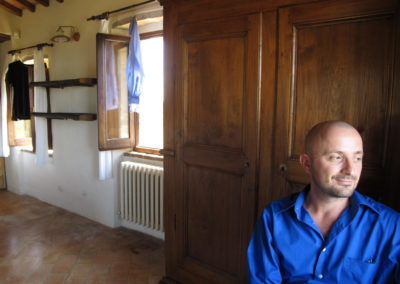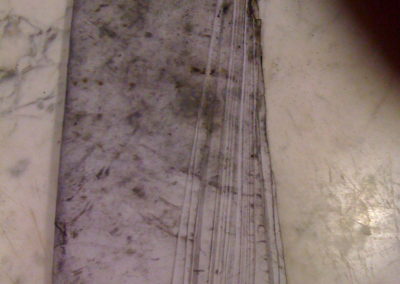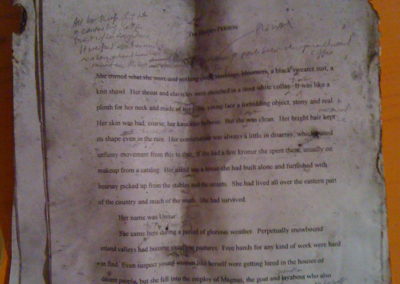Most of what surrounds you at Civitella Ranieri either remains close to its natural state (the stones, the cedars) or has been made by hand from basic materials (the timbers in the bedroom ceiling, the castle bricks, the food). Plastic does not abound. The enduring handiwork of vanished craftsmen is everywhere. The place was plainly made by people, for the safety and subsistence of people. When you climb the stairs, your feet fit the steps as though no fundamental difference existed among you, the dead people who lived here five centuries ago, and the ones who will climb stairs after you have died.
I wanted the story I was writing here to learn from the place. I wanted to make something by hand, for other people, with whom I shared a common shape in body and mind. I didn’t care about being efficient or keeping busy. I wanted to work. And my luck in having work to do began to seem like a stroke of grace that I had done nothing to deserve and so had not right to waste.
The other morning I found on the desk a note I had written half-asleep the night before. Something here had reminded me of the Shakers—the 19th-century Christian sect famous for tasteful chairs, celibacy, and wacky ecstatic dances, that regarded daily labor, from spinning to carpentry, as a kind of prayer and a blessing. The note said, “Work is a gift.”
From The End
He was five feet one inch tall in street shoes, bearlike in his round and jowly face, hulking in his chest and shoulders, nearly just as stout around the middle, but hollow in the hips, and lacking a proper can to sit on (though he was hardly ever known to sit), and wee at the ankles, and girlish at his tiny feet, a man in the shape of a lightbulb. He was faintly green-skinned, psoriatic about the elbows and the backs of knees, his shaven cheeks untouched by scars of any sort, faithful to a fault to his daily labors, grudgeless against the wicked world, thankful for it, even; a baker of breads with and without seeds, modest cakes, seasonal frosted treats; supplier to all neighborhoods and occasional passers-through; a reader of the p.m. papers, as all of his vocation are, born on the feast of Saint Lucy, 1895; a prideful Ohioan; a sucker of caramel candies when cigarettes he forbade himself from eight o’clock to two; possessor of a broad and seamless brow and a head of sleek black undulant hair, the eyes goonish, unnaturally pale and blue, set deep in the skull in swollen rain-clouded pouches, the eyes of one poisoned with lead, who had not in all his days addressed a piece of speech to more than two persons at once; a looker-right-through-you if he pleased, as old cats look, accustomed to suffering the company of others but always in need of privacy; the baker of Elephant Park; an unambitious businessman; a soul liberated from worry by luck and self-conquest; a weakhearted sparer of the rod with his boys; a measured drinker of spirits who prayed daily for the salvation of his sons and wife; a smoker nevertheless immune to colds and grippes; an ignorer of the weather; a lover of streaks, content and merciful; an unremarkable Christian.



